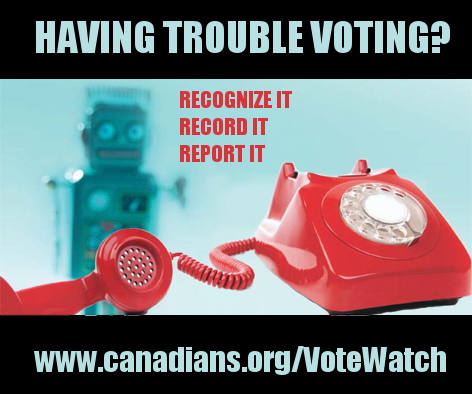Chip in to keep stories like these coming.
While it’s too early to say whether there will be a higher overall voter turnout this election, the indications look positive.
CBC reports, “Canada’s chief electoral officer sees positive signs that voters are keenly engaged in the election, including students and citizens living abroad. …[Marc Mayrand says] there are positive signs that even more people are participating in the democratic process.” Mayrand observes, “We see more people voting by mail, more people voting from abroad, more people having a vote on campus. This week in the first three days we had 42,000 students who voted. So all across we see Canadians quite engaged, and that’s good as far as I’m concerned.”
And on August 14, the Canadian Press reported, “Mayrand says he’s surprised at how many people have already signed up to vote.” At that time, Mayrand commented, “If you asked me before whether in the first week of August we’d see 13,000 Canadians registered for the first time for an election, I would not have bet on that. It is a sign out there people are paying attention. We had an average number of calls of 15,000 per day this election. And being so early in the process, that is somewhat unusual, but it points out people are paying attention.”
In the last federal election in May 2011, voter turnout was 61.4 per cent overall and just 38.8 per cent for youth.
It has been well established that a low voter turnout will benefit the Conservatives. Duncan Cameron writes, “The 25/60 rule says when only 60 per cent of Canadian citizens go out to vote, 25 per cent of the voters can deliver a majority government.” Elections Canada says there were 24.2 million eligible voters in the last federal election. The Harper Conservatives received their majority with just 5.8 million of those votes. But more than 8.8 million Canadians voted for other parties and 9.4 million Canadians did not vote. 5.8 million Conservative votes from 24.2 million eligible voters is 23.9 per cent. Cameron says, “The disengagement from the electoral process is the key to the success of the Conservatives in Canada and of right-wing politics elsewhere.”
It has also been calculated that a combined total of just 6,201 votes in 14 closely contested ridings gave Harper his majority in 2011.
This is why the Council of Canadians has focused on getting out the vote this election.
In the pre-election period, Council of Canadians chairperson Maude Barlow spoke at ten town hall meetings across the country encouraging people to vote: Vancouver (April 30), Ottawa (May 7), Winnipeg (May 12), Saskatoon (May 13), Bridgewater (May 19), Moncton (May 20), Scarborough (June 1), Toronto (June 18), London (June 22) and Courtenay (June 24). Council of Canadians youth vote campaigner Brigette DePape was at five campus events with her Go Vote message for students: University of Winnipeg (February 25-26), University of Regina (March 5-6), Simon Fraser University (March 16-17), Ryerson University (March 23), and Nipissing University (March 30).
And in July, the Council of Canadians and the Canadian Federation of Students were in Ontario Superior Court seeking an injunction to suspend a key provision of C-23, the so-called Fair Elections Act. The Canadian Press has reported, “The new rules [in C-23] forbid voters from using the Elections Canada voter information card mailed to their home as proof of residency – although some 400,000 voters used the cards for this purpose in the 2011 federal election.” Our lawyer Steven Shrybman highlighted, “Remember that a few hundred votes, even a few dozen votes, can determine the outcome of an election in any riding.”
Since the election was called on August 2, the Council of Canadians has distributed more than 150,000 voters guides and how to vote guides, 39 chapters have organized 161 varied ‘Go Vote’ actions across the country, two ‘Storm the Dorm’ youth vote days of action (on September 9 and October 5) have been organized on numerous campuses, a youth vote video was launched (with more than 215,000 views on various platforms so far), and much more. On October 19, the Council of Canadians will be reminding the thousands of people who have signed our ‘I will vote’ pledge to head to the polls. We have also launched VoteWatch, an online election fraud and voter suppression reporting service.
Barlow says, “If we can get the issues out and get more people voting, we can get rid of Harper even if there isn’t any formal coalition in place ahead of time. The Conservatives don’t care about us and I don’t believe they try to represent us. They only care about the 35 per cent of the population they want to vote for them.”
A poll by Nanos Research this morning puts the Liberals at 34 per cent of the popular vote, with the Conservatives close behind at 31 per cent, the NDP at 25 per cent, the Bloc Quebecois at 5.3 per cent and the Greens at 4.2 per cent. On Tuesday (October 6), the Laurier Institute projected the Conservatives could win 123 seats, the Liberals 113 seats, the NDP 98 seats, the Bloc Quebecois 3 seats, and the Green Party 1 seat. That same day, CBC projected the Conservatives could win 109 to 155 seats, the Liberals 91 to 130 seats, the NDP 75 to 108 seats, the Bloc 1 to 8 seats, and the Greens 1 seat.
Given 170 seats are needed to form a majority in the House of Commons, a minority government seems the most likely outcome of the October 19 election at this point. Most pundits are commenting that the major question in the tightening two-way race is whether it will be a Conservative or Liberal minority government.
For more on our democracy campaign and information on how to vote this election, please click here.
Chip in to keep stories like these coming.




